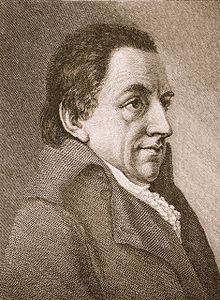
Back Johann Gottlieb Fichte Afrikaans Johann Gottlieb Fichte ALS Johann Gottlieb Fichte AN يوهان غوتليب فيشته Arabic يوهان جوتليب فيشته ARZ Johann Gottlieb Fichte AST Yohann Qotlib Fixte Azerbaijani یوهان قوتلیب فیشته AZB Іаган Готліб Фіхтэ Byelorussian Йохан Готлиб Фихте Bulgarian
Johann Gottlieb Fichte | |
|---|---|
 | |
| Born | 19 May 1762 |
| Died | 29 January 1814 (aged 51) |
| Nationality | German |
| Education | Schulpforta University of Jena (1780; no degree) Leipzig University (1781–1784; no degree) |
| Era | 18th-century philosophy |
| School | German idealism |
| Institutions | University of Jena University of Erlangen University of Berlin |
Main interests | |
Notable ideas | List
|
| Signature | |
 | |
Johann Gottlieb Fichte (/ˈfɪktə/;[11] German: [ˈjoːhan ˈɡɔtliːp ˈfɪçtə];[12] 19 May 1762 – 29 January 1814) was a German philosopher who became a founding figure of the philosophical movement known as German idealism, which developed from the theoretical and ethical writings of Immanuel Kant. Recently, philosophers and scholars have begun to appreciate Fichte as an important philosopher in his own right due to his original insights into the nature of self-consciousness or self-awareness.[13] Fichte was also the originator of thesis–antithesis–synthesis,[2] an idea that is often erroneously attributed to Hegel.[14] Like Descartes and Kant before him, Fichte was motivated by the problem of subjectivity and consciousness. Fichte also wrote works of political philosophy; he has a reputation as one of the fathers of German nationalism.
- ^ "Fichte in Berlin to Schelling in Jena, May 31–August 7[8?], 1801," in: Michael Vater and David W. Wood (eds. and trs.), The Philosophical Rupture between Fichte and Schelling: Selected Texts and Correspondence (1800-1802), SUNY Press, 2012, p. 56.
- ^ a b "Review of Aenesidemus" ("Rezension des Aenesidemus", Allgemeine Literatur-Zeitung, 11–12 February 1794). Trans. Daniel Breazeale. In Breazeale, Daniel; Fichte, Johann (1993). Fichte: Early Philosophical Writings. Cornell University Press. p. 63. (See also: FTP, p. 46; Breazeale 1980–81, pp. 545–68; Breazeale and Rockmore 1994, p. 19; Breazeale 2013, pp. 36–37; Waibel, Breazeale, Rockmore 2010, p. 157: "Fichte believes that the I must be grasped as the unity of synthesis and analysis.")
- ^ Grundlage der gesamten[sic] Wissenschaftslehre, 1794/1795, p. 274.
- ^ Breazeale 2013, pp. 305 and 308 n. 24.
- ^ Gesamtausgabe I/2: 364–65; Daniel Breazeale, "Fichte's Conception of Philosophy as a "Pragmatic History of the Human Mind" and the Contributions of Kant, Platner, and Maimon," Journal of the History of Ideas, 62(4), Oct. 2001, pp. 685–703; Zöller 1998, p. 130 n. 30; Sedgwick 2007, p. 144 n. 33; Breazeale and Rockmore 2010, p. 50 n. 27: "Α »history of the human mind« is a genetic account of the self-constitution of the I in the form of an ordered description of the various acts of thinking that are presupposed by the act of thinking the I"; Posesorski 2012, p. 81: "Pragmatische Geschichte des menschlichen Geistes designates reason's timeless course of production of the different levels of the a priori system of all knowledge, which are exclusively uncovered and portrayed genetically by personal self-conscious reflection"; Breazeale 2013, p. 72.
- ^ The principle of reciprocal determination (der Satz der Wechselbestimmbarkeit) is the principle that, according to Fichte (Wissenschaftslehre nova methodo, "Halle Nachschrift," 1796/1797), explicitly guides all philosophical reflection; it is derived from the reciprocally determinable relationship between the finite I and its other. In a similar way, Fichte had derived in his Foundations of the Science of Knowledge (publ. 1794/1795, paras. 1–2) the logical laws of identity and non-contradiction from the original positing and counter-positing of the I. (See Breazeale 2013, pp. 54–5.)
- ^ Gesamtausgabe II/3: 24–25; Breazeale 2013, p. 198.
- ^ Fichte, J. G., "Zweite Einleitung in die Wissenschaftslehre" ("Second Introduction to the Wissenschaftslehre"; 1797); Rocío Zambrana, Hegel's Theory of Intelligibility, University of Chicago Press, 2015, p. 151 n. 15.
- ^ FTP, p. 365; Waibel, Breazeale, Rockmore 2010, p. 157; Breazeale 2013, pp. 354 and 404–439.
- ^ Cf. KpV A219.
- ^ "Fichte". Random House Webster's Unabridged Dictionary.
- ^ "Duden | Fichte | Rechtschreibung, Bedeutung, Definition". Duden (in German). Retrieved 20 October 2018.
Fịchte
- ^ Cite error: The named reference
Henrichwas invoked but never defined (see the help page). - ^ Robert C. Solomon, In the Spirit of Hegel, Oxford University Press, p. 23.